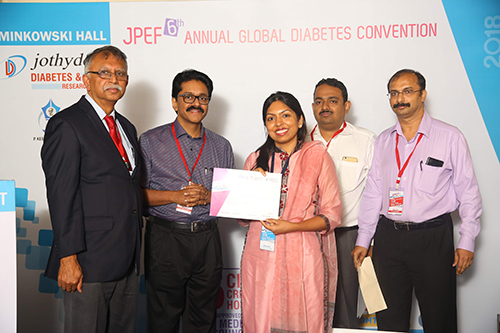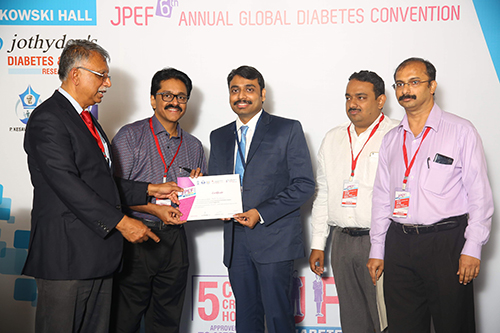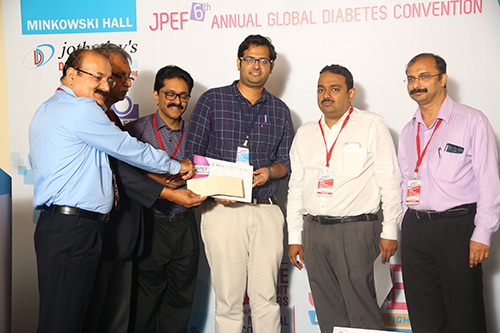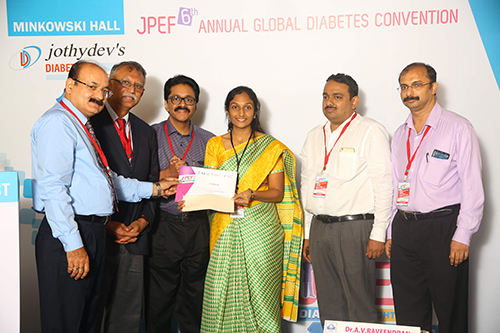
11. JPEF 2018 Abstracts and Pictures |
Abstracts Selected for Oral Presentation at JPEF 2018
![]() 6th JPEF Two-Day Annual Global Diabetes Convention offered a platform for Modern medicine doctors, Dietitians, Researchers and Allied healthcare professionals to present their original scientific research conducted in the field of diabetes. The best four original research papers, from among the numerous submissions received, were selected by an expert panel consisting of Dr. A.V.Raveendran (Specialist in Internal Medicine, Badr Al Samaa, Barka, Sultanate of Oman), Dr.Sumesh Raj (Professor Of Medicine, Sree Gokulam Medical College, Trivandrum) and Dr. Jothydev Kesavadev (Managing Trustee, P Kesavadev Trust). The winners received an opportunity to present their abstract during a scientific session at JPEF 2018 and were also awarded cash prizes. Dr. Aishwarya Kanneganti’s (Research Associate, Fernandez Hospital, Hyderabad) original research entitled’ Glycemic response to moderate carbohydrate breakfasts in gestational diabetes mellitus’ was ranked first by the judging panel. The abstracts of the selected four studies are given below.
6th JPEF Two-Day Annual Global Diabetes Convention offered a platform for Modern medicine doctors, Dietitians, Researchers and Allied healthcare professionals to present their original scientific research conducted in the field of diabetes. The best four original research papers, from among the numerous submissions received, were selected by an expert panel consisting of Dr. A.V.Raveendran (Specialist in Internal Medicine, Badr Al Samaa, Barka, Sultanate of Oman), Dr.Sumesh Raj (Professor Of Medicine, Sree Gokulam Medical College, Trivandrum) and Dr. Jothydev Kesavadev (Managing Trustee, P Kesavadev Trust). The winners received an opportunity to present their abstract during a scientific session at JPEF 2018 and were also awarded cash prizes. Dr. Aishwarya Kanneganti’s (Research Associate, Fernandez Hospital, Hyderabad) original research entitled’ Glycemic response to moderate carbohydrate breakfasts in gestational diabetes mellitus’ was ranked first by the judging panel. The abstracts of the selected four studies are given below.
DB18.011A
Glycemic Response to Moderate Carbohydrate Breakfasts in Gestational Diabetes Mellitus
DR. AISHWARYA KANNEGANTI1, SAJID ASMA2, DR. BODDULA RAMAN3, DR. SASHI LATHA4.
Fernandez Hospital, Hyderabad, Telangana. 1 Research Associate, 2 Senior Nutritionist, 3 Senior Consultant, 4 Chief Consultant Nutritionist.
 |
BACKGROUND: Carbohydrate restriction, particularly at breakfast has traditionally been advocated in management of gestational diabetes mellitus. Indian breakfasts are primarily carbohydrate based and such restriction may not be acceptable to patients.
AIM: To assess if low glycemic index, moderate carbohydrate breakfasts are as effective as low glycemic index, lower carbohydrate breakfasts in maintaining post prandial glycemic targets. Secondary objective was to compare satiety and palatability of the breakfasts.
METHODS: This was an audit of 2-hour post prandial glycemic response to diabetic breakfasts served at an urban tertiary maternity center. Women were served a breakfast with carbohydrate content of either <40 g, 40-50g or >50g. Glycemic values were measured using finger prick capillary blood sampling and a 5-point Likert scale was used to assess satiety and palatability. Multivariate logistic regression was used to compare glycemic response and generalized logistic regression was done to assess if carbohydrate content affected Satiety and palatability scores.
RESULTS: 34 women with a mean age of 30.76 ± 7.56 were enrolled. Mean 2-hour post prandial glycemic response to the breakfasts containing <40 g, 40-50g and >50g carbohydrate was 113.44 ± 10.97, 109.69 ±21.49 and 120.33 ± 19.82 respectively (P value=0.45). There was no significant difference in satiety scores. Palatability of lower carbohydrate breakfast was higher (p=0.05).
CONCLUSIONS: This study showed that a moderate amount of low glycemic index carbohydrate can be safely consumed at breakfast by gestational diabetics and is acceptable to patients.
DB18.03A
Management Profile and Risk Estimation of Newly Detected Diabetes Mellitus in Post Adjuvant Chemotherapy Carcinoma Breast Cases from a Teritiary Care Centre
DR. ANIL SUNDARAM1, DR. NIZARUDEEN2.
Dept. of General Surgery, Government Medical College Trivandrum, Kerala.
1 Assistant Professor, 2 Professor
 |
INTRODUCTION: Trivandrum is considered as the capital of breast cancer in India. Detection rate in southern part of Kerala is the highest in country because of the intense screening programs conducted by peripheral health care workers. Hyperglycemia during chemotherapy occurs in approximately 10% to 30% of patients. Glucocorticoid-induced hyperglycemia often develops because of increased insulin resistance, diminished insulin secretion, and exaggerated hepatic glucose output. Screening strategies for this condition include fasting glucose testing, hemoglobin A1c testing, oral glucose loading, and fasting plasma glucose screens. The management of hyperglycemia starts with insulin or sulfonylurea, depending on the type, dose, and delivery of the glucocorticoid formulation. Aute stresses experienced during cancer treatment, potentially by the chemotherapeutic agents themselves, exacerbate insulin resistance, which leads to hyperglycemia.
AIM: Risk estimation and management of newly detected diabetes mellitus after adjuvant chemotherapy for carcinoma breast cases.
MATERIALS & METHODS: Forty five cases of carcinoma breast stage 1 and 2 disease who underwent mastectomy followed by adjuvant chemotherapy from January 2016 to January 2018 was included. 16 cases developed new onset diabetes and the longest follow up was for 2 years and shortest one was for 6 months.HbA1c was tested 2 cycles after chemotherapy and 3 and 6 months in follow up.
DISCUSSION: Mean age was 55.11 (Standard error–1.25b) (minimum 35 and maximum 72). All patients who underwent mastectomy for stage 1 and stage 2 disease had to undergo adjuvant chemotherapy based on grade and receptor status of the specimen.
CONCLUSION: The underlying mechanisms for chemotherapy induced diabetes mellitus: functional damage to pancreatic β-cells, weight gain, insulin resistance, various hormonal deficiencies, damage to non-hormonal systems, changes in lipid metabolism, inflammatory mediators and adipokines, and reduced physical activity. Hyperglycemia induced by chemotherapy is best managed by insulin preparations rather than OHA, as supported by good glycemic control of new onset diabetes by 14 of 16 cases in the present study. HbA1c monitoring is also mandatory for glycemic control. Hyperglycemia related to anti-cancer treatments, frequent monitoring and active management should be combined to prevent the adverse events caused by acute hyperglycemia.
DB18.017A
Necrotizing Pneumonia in Type 2 Diabetes
DR. JIJUN M IGNATIUS1, DR. SANJAY ZACHARIAH2, DR. SUDIN KOSHY3
Department of Internal Medicine, Sree Gokulam Medical College, Trivandrum, Kerala.
1 3rd year PG student, 2 Professor Medicine, 3 Professor Pulmonology.
 |
INTRODUCTION: Pneumonia progressing to necrotizing type has high mortality rate and is extremely rare, but when reported in literature, it is mostly seen with uncontrolled diabetes. Necrotizing pneumonia lies on a spectrum between lung abscess and pulmonary gangrene. The decreased blood supply to lung tissue impedes delivery of antibiotics, causing progressive destruction and pulmonary gangrene. Hence, “time means tissue and life”.
CASE REPORT: 61 year old male, chronic alcoholic, diabetic for 8 years presented with pneumonia which was not responding to antibiotics. Chest X-ray showed multiple cavitory lesions in left upper zone. Emergency CT chest with contrast confirmed Necrotizing pneumonia. He was started on Broad spectrum antibiotic with control of blood sugars. Sputum culture yielded Klebsiella. Lesion resolved to lung abscess which later resolved completely.
DISCUSSION: The early administration of antibiotics before the occurrence of significant underperfusion of infected lung tissue helped in local tissue delivery of antibiotics and resolution. CT imaging study proved to be a critical tool in understanding the condition. Hence, Early CT study and administration of Broad spectrum antibiotics in unresolved pneumonia especially among diabetic patients is not only lifesaving but also guarantees them a normal life ahead.
DB18.015A
Impact of “Intensive Counseling Therapy” in Uncontrolled Type 2 Diabetes Mellitus Patients on Improved Quality Of Life
ZANKHANA SHETTY
Diabetes Educator, Fortis Hospital, Mumbai.
 |
ABSTRACT: A total of 91 subjects (46 control and 45 interventional), were studied for the three months for observing the effect of intensive diabetes education on quality of life (QOL) in patients with uncontrolled type 2 diabetes mellitus. Intensive diabetes education and counseling were given to subjects of the interventional group. Subjects of the control group were given routine treatment and no counseling was offered. A quality life questionnaires and knowledge, attitude and practice (KAP) questionnaires were administered at baseline and at the end of the study (three months). Metabolic control like fasting blood glucose, postprandial blood glucose and glycosylated hemoglobin was assessed at baseline and at the end of three months. There was an overall improvement in KAP score of the interventional group as compared to control group. Knowledge score improved from 10.9±2.5 to 13.5± 2.6, (p=0.005), attitude score was 1.13±0.9 to 2.7±1.04 (p<0.001) and practice score 1.6±1.01 to 3.2±1.3 (p= 0.004) at the end of three months.
Quality life score also improved significantly in the interventional group as compared to control group at the end of three months. Satisfaction score improved from 15.6±5.1 to 20.8±6.2 (p= 0.001) attitude scale 24.6±8.4 to 30.4±5.6 (p= 0.004), diet and exercise management 9.8±2.5 to 11.9±2.3 (p=0.042), health status 7± 2.2 to 11.8±1.7 (p= 0.004), psychological wellbeing 9.9±2.9 to 10.8±2.2 (p=0.045). There was no significant improvement in the self-management of diabetes at the end of three months (p=0.062). Metabolic control improved significantly after three months. Fasting blood glucose and postprandial blood glucose improved from 182.5±42.1mg/dl to 136.3±9.08mg/dl (p= 0.001), 267±56mg/dl to 182 ±43.3mg/dl (p=0.001) respectively. Glycosylated hemoglobin significantly improved in interventional group 9.4±1% to 8.2± 1.3 % (p = 0.001).
For enquiries info@jothydev.net.
Please visit: jothydev.net | research.jothydev.com | diabscreenkerala.net | jothydev.com/newsletter
